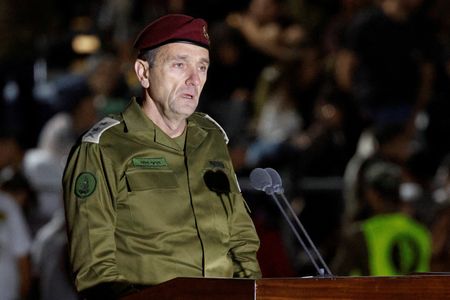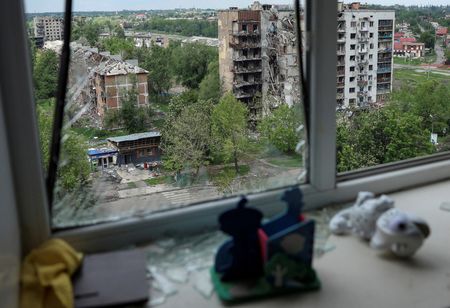By Steven Scheer
JERUSALEM (Reuters) -Israel’s army chief Herzi Halevi said on Tuesday he would resign on March 6, taking responsibility for the massive security lapse on Oct. 7, 2023, when Palestinian Hamas gunmen from Gaza carried out a cross-border attack on Israel.
Halevi, who had been widely expected to step down in the wake of the deadliest single day in Israel’s history, said he would complete the Israel Defence Forces’ inquiries into Oct. 7 and strengthen the IDF’s readiness for security challenges.
It was not immediately clear who would replace Halevi, who said he would transfer the IDF command to a yet-to-be-named successor.
Despite public anger over the attack, Prime Minister Benjamin Netanyahu’s government has resisted calls to open a state inquiry into its own responsibility for the security breach that resulted in 1,200 Israelis being killed and about 250 hostages taken.
“On the morning of Oct. 7, the IDF under my command failed in its mission to protect the citizens of Israel,” Halevi wrote in his resignation letter to Defence Minister Israel Katz.
Israel, he added, paid heavily in human lives and those kidnapped and was wounded in “body and soul.”
“My responsibility for the terrible failure accompanies me every day, hour by hour, and will do so for the rest of my life,” said Halevi, a military veteran of four decades.
In a televised address, Halevi promised a deep and transparent investigation, the details of which would be presented to the defence minister and, as much as permissible, to the public.
Maariv news outlet reported that the heads of the navy and air force would soon submit their resignations.
“I hope that our government will take the same responsibility,” former diplomat Zeev Harel told Reuters.
Halevi was in lockstep with former defence minister Yoav Gallant, who was fired by Netanyahu in November, and at loggerheads with some ministers over military conscription exemptions given to ultra-Orthodox Jewish seminary students.
A number of senior military officers have already resigned over Oct. 7, and the head of the military’s Southern Command, Major-General Yaron Finkelman, also said he would be resigning.
“Maybe our prime minister should take example from the personal responsibility that the chief of staff has taken,” activist Gil Ashkenazy, 60, told Reuters.
After 15 months of war in Gaza, the first phase of a ceasefire deal with Hamas went into effect on Sunday, with three hostages released from a planned 33 in the next six weeks. Some 94 hostages are believed to remain in Gaza, though some may have died in captivity.
HARDLINERS RAPPED HALEVI’S CONDUCT OF GAZA WAR
Katz thanked Halevi and said there would be an orderly search for his replacement. Netanyahu also accepted Halevi’s resignation.
Halevi was often criticized by hardliners in Netanyahu’s government including Finance Minister Bezalel Smotrich, who said his conduct of the war in Gaza was too soft.
More than 46,000 Palestinians have been killed in the war, and the heavily built-up territory has been widely demolished by Israeli bombardments and airstrikes.
Smotrich on Tuesday praised Halevi for the military’s success in shattering Hamas’ military capabilities during the war but also put blame on his shoulders for Hamas’ attack that began it.
“My criticism of his failure in the campaign to eliminate Hamas’ civilian and governmental capabilities, as well as his responsibility for the October 7th failure, does not diminish the great gratitude we owe him for all his work and contributions over the years and his achievements,” said Smotrich, who opposed the ceasefire and hostage release deal.
“The coming period will be marked by the replacement of the senior military command as part of preparations for the renewal of the war, this time in the West Bank until complete victory.”
Halevi said that despite the failings of Oct. 7, Israel had notched many military achievements since then which had “changed the Middle East”. Since then, Israel’s military regained its prowess as the most formidable in the region, and surveys show strong public support for the IDF.
(Additional reporting by Maayan Lubell in Jerusalem and Jana Choukeir in Dubai; editing by Alison Williams and Mark Heinrich)











